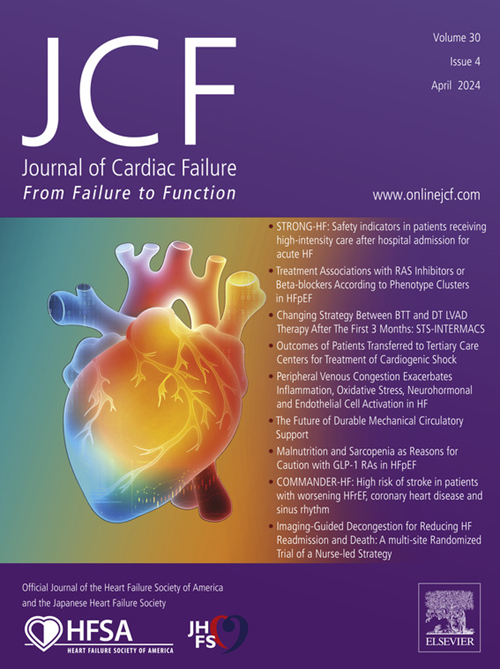Denial for Advanced Heart Failure Therapies Due to Psychosocial Stressors: Who Comes Back?
IF 6.7
2区 医学
Q1 CARDIAC & CARDIOVASCULAR SYSTEMS
引用次数: 0
Abstract
Background
Psychosocial evaluations to assess candidacy for advanced heart failure therapies are not standardized across institutions, potentially contributing to disparities in approval for advanced therapies. Remediation rates of psychosocial stressors among patients with advanced HF and reconsideration for advanced therapies have not been well-described.
Methods and Results
We performed a retrospective, single-center study of 647 adults evaluated for heart transplant and ventricular assist device implantation between 2014 and 2020, of whom 89 (14%) were denied for psychosocial stressors, including caregiver, substance use, housing, financial, or mental health concerns. Later reevaluation occurred in 32 patients (36%), of whom 23 were then approved. Patients initially declined were mostly male (76%), White (74%), and urban (79%). Reevaluation occurred in more women than men (43% vs 34%), Black patients than White (43% vs 37%), and urban patients than rural (39% vs 28%). Patients had fewer psychosocial stressors at reevaluation (median 0.5) than at initial denial (median 2.0). Caregiver and substance use concerns were the most prevalent stressors in patients never returning for or subsequently denied at reevaluation.
Conclusions
Caregiver and substance use concerns were common in patients denied for psychosocial reasons. Future efforts should focus on early screening for these stressors and the implementation of a systematic reevaluation process.
因社会心理压力而拒绝接受晚期心力衰竭治疗:谁会回来?
背景:用于评估晚期心力衰竭治疗候选资格的社会心理评估在不同机构之间并不统一,这可能会导致晚期治疗获批方面的差异。对晚期心力衰竭患者社会心理压力的补救率以及重新考虑晚期疗法的情况还没有很好的描述:我们对 2014 年至 2020 年期间接受心脏移植和 VAD 评估的 647 名成人进行了回顾性单中心研究,其中 89 人(14%)因心理社会压力因素(包括照顾者、药物使用、住房、财务或心理健康问题)而被拒绝。后来对 32 名(36%)患者进行了重新评估,其中 23 人获得批准。最初被拒绝的患者多为男性(76%)、白人(74%)和城市居民(79%)。重新评估的患者中,女性多于男性(43% 对 34%),黑人患者多于白人(43% 对 37%),城市患者多于农村患者(39% 对 28%)。患者在重新评估时的社会心理压力(中位数=0.5)少于初次拒绝时(中位数=2)。照顾者和药物使用问题是从未复诊或随后在重新评估时被拒绝的患者最普遍的压力源:结论:在因社会心理原因而被拒绝的患者中,照顾者和药物使用问题很常见。今后的工作重点应是及早筛查这些压力源,并实施系统的再评估流程。
本文章由计算机程序翻译,如有差异,请以英文原文为准。
求助全文
约1分钟内获得全文
求助全文
来源期刊

Journal of Cardiac Failure
医学-心血管系统
CiteScore
7.80
自引率
8.30%
发文量
653
审稿时长
21 days
期刊介绍:
Journal of Cardiac Failure publishes original, peer-reviewed communications of scientific excellence and review articles on clinical research, basic human studies, animal studies, and bench research with potential clinical applications to heart failure - pathogenesis, etiology, epidemiology, pathophysiological mechanisms, assessment, prevention, and treatment.
 求助内容:
求助内容: 应助结果提醒方式:
应助结果提醒方式:


